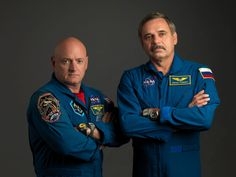Kelly, Kornienko back after year-long space odyssey
03 Mar 2016
Astronaut Scott Kelly returned to Earth on Wednesday after an unprecedented year in space for NASA, landing in barren Kazakhstan with Russian cosmonaut Mikhail Kornienko who shared his whole space station journey.
 | |
| NASA Astronaut Scott Kelly and Russian Cosmonaut Mikhail Kornienko |
Their Soyuz capsule parachuted onto the central Asian steppes and ended a science-rich mission at the International Space Station that began last March and was deemed a stepping stone to Mars.
It was a triumphant homecoming for Kelly and Kornienko after 340 days in space. They checked out of the space station three and a half hours earlier. As their Soyuz undocked, calls of "Godspeed" filled the Twitterverse.
The pair travelled 144 million miles through space, circled the world 5,440 times and experienced 10,880 orbital sunrises and sunsets during the longest single spaceflight by an American.
Kelly posted one last batch of sunrise photos Tuesday on Twitter, before quipping, "I gotta go!" His final tweet from orbit came several hours later: "The journey isn't over. Follow me as I rediscover # Earth!"
Piloting the Soyuz capsule home for Kelly, 52, and Kornienko, 55, was the much fresher and decade younger cosmonaut Sergey Volkov, whose space station stint lasted the typical six months.
They were met by freezing temperatures, just like when they launched from Kazakhstan on March 27th last year.
The two yearlong spacemen faced a series of medical tests following touchdown. Before committing to even longer Mars missions, NASA wants to know the limits of the human body for a year, minus gravity.
As he relinquished command of the space station Monday, Kelly noted that he and Kornienko "have been up here for a really, really long time" and have been jokingly telling one another, "We did it!" and "We made it!"
"A year now seems longer than I thought it would be," Kelly confided a couple weeks ago.
Not quite a year - 340 days to be precise, based on the Russian launch and landing schedule. But still record-smashing for NASA.
Kelly's closest US contender trails him by 125 days. Russia continues to rule, however, when it comes to long-duration spaceflight. The world record of 438 days was set by a Russian doctor during the mid-1990s.
"A really smart person said to me one time, 'Teamwork makes the dreamwork in spaceflight,' and spaceflight is the biggest team sport there is," Kelly said Monday. He acknowledged each of the 13 US, Russian, European and Japanese space fliers with whom he and Kornienko lived during the past year. "It's incredibly important that we all work together to make what is seemingly impossible, possible."
For NASA, that mission possible is Mars.
Scientists are hoping for more one-year subjects as NASA gears up for human expeditions to Mars in the 2030s. Radiation will be a top challenge, along with the body and mind's durability on what will be a 2½-year journey round trip.
Twin bonanza
The choice of the pioneering Kelly turned out to be a bonanza. His identical twin, retired astronaut Mark Kelly, offered himself up as a medical guinea pig so researchers could study the differences between the genetic doubles, one in space and the other on the ground. They provided blood, saliva and urine samples, underwent ultrasounds and bone scans, got flu shots and more, all in the name of science.
Once on the ground, Kelly and Kornienko split. Kelly heads to Houston with two flight surgeons and several other NASA reps, arriving late tonight. That's where he'll be reunited with his two daughters, ages 21 and 12; his girlfriend, a NASA public affairs representative at Johnson Space Center; and his brother.
Kornienko returns to his home in Star City, Russia, near Moscow, to his wife, daughter and toddler grandson.
Kelly has spent more time in space altogether than any other American: 520 days over the course of four missions. Realizing this is likely his last journey, it was "a little bittersweet" saying goodbye to his orbiting home. He'll have plenty of pictures, at least, for the scrapbook - he posted 1,000 dramatic, colour-drenched pictures of Earth on his Twitter and Instagram accounts.
"What a ride he took us on!" fellow astronaut Reid Wiseman said in a tweet from Houston.
"Those of us who dream of sending astronauts to deep space thank Scott Kelly for his sacrifice," said Jim Green, director of planetary science for NASA, "and are thrilled to welcome him home."



















